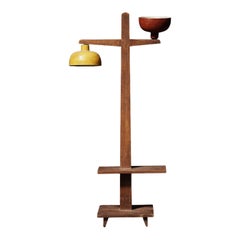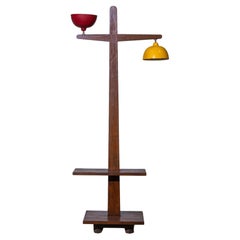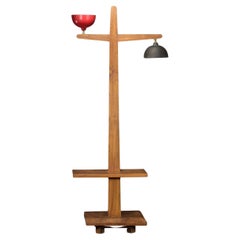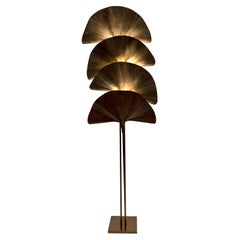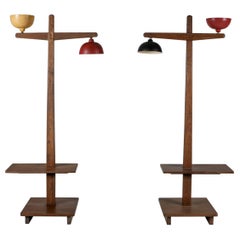Pierre Jeanneret Lighting
If his famed cousin and longtime colleague Charles-Édouard Jeanneret — better known as Le Corbusier — was the visionary, then Pierre Jeanneret was the member of the architecture and design team who got things done. In recent years, Jeanneret has emerged from Le Corbusier’s shadow, as collectors have discovered his simple and striking chairs, benches, coffee tables and other furniture creations.
Jeanneret studied at the École des Beaux-Arts in Geneva and after he graduated in 1921 he became a partner in Le Corbusier’s office in Paris. The pair collaborated on numerous residential projects, most notably the Villa Savoye, the iconic modernist house in suburban Paris completed in 1931.
Jeanneret also worked with the great Charlotte Perriand on the Grand Modele line of tubular metal furnishings that was a sensation at the annual Salon d’Automne design expo in 1929. A rift developed between Jeanneret and his cousin during World War II, as the former joined the French resistance, while Le Corbusier cooperated with the occupying authorities in Vichy. The two did not work together again until 1950, when Le Corbusier persuaded Jeanneret to help execute the master plan for the new city of Chandigarh in Punjab, India. Jeanneret lived and worked there until the final years of his life.
A hallmark of Jeanneret’s furniture designs is his great sensitivity to materials. In contrast to the tubular-steel chairs produced by Marcel Breuer and other members of the Bauhaus, the chromed metal pieces designed by Jeanneret and Perriand — including such as the now-classic LC4 chaise longue and the Grand Confort lounge chair — have a sensuous, relaxed and welcoming look. Conversely, while Jeanneret uses essentially geometric forms for his wooden seating pieces, they exude warmth by nature of the material.
One of Jeanneret’s first manufactured designs in wood is the Model 92 Scissors chair, licensed by Hans and Florence Knoll when they were touring postwar France. But Jeanneret’s finest work in furniture was done in Chandigarh, and these are the pieces that have earned him recent renown.
Crafted of teak, the Chandigarh designs range from low-slung lounge chairs and armchairs with cane seats to desks and tables, most with Jeanneret’s signature drafting compass-shaped legs. Many such pieces on the market today are refurbished, having been found by dealers languishing in scrapyards in India in the late 1990s. Chandigarh is now taking better care of its modernist heritage, making available Jeanneret works all the rarer.
Find authentic vintage Pierre Jeanneret chairs, case pieces, tables and other furniture today on 1stDibs.
1950s Indian Vintage Pierre Jeanneret Lighting
Aluminum
Mid-20th Century Indian Mid-Century Modern Pierre Jeanneret Lighting
Aluminum
1950s Indian Mid-Century Modern Vintage Pierre Jeanneret Lighting
Aluminum
1970s Unknown Mid-Century Modern Vintage Pierre Jeanneret Lighting
Other
1970s Italian Mid-Century Modern Vintage Pierre Jeanneret Lighting
Brass
1970s Italian Mid-Century Modern Vintage Pierre Jeanneret Lighting
Chrome, Steel
Mid-20th Century French Mid-Century Modern Pierre Jeanneret Lighting
Aluminum, Brass, Steel
1950s Italian Mid-Century Modern Vintage Pierre Jeanneret Lighting
Brass
1970s French Mid-Century Modern Vintage Pierre Jeanneret Lighting
Chrome
1940s Swedish Mid-Century Modern Vintage Pierre Jeanneret Lighting
Fir
1970s American Mid-Century Modern Vintage Pierre Jeanneret Lighting
Metal
1970s American Mid-Century Modern Vintage Pierre Jeanneret Lighting
Metal, Chrome
1950s Italian Mid-Century Modern Vintage Pierre Jeanneret Lighting
Wood
1960s Italian Mid-Century Modern Vintage Pierre Jeanneret Lighting
Aluminum, Brass
Mid-20th Century French Mid-Century Modern Pierre Jeanneret Lighting
Brass
1950s Indian Mid-Century Modern Vintage Pierre Jeanneret Lighting
Teak
Pierre Jeanneret lighting for sale on 1stDibs.
Creators Similar to Pierre Jeanneret
- 1stDibs ExpertFebruary 21, 2024Whether Pierre Jeanneret chairs are comfortable or not is largely a matter of personal preference. However, the Swiss designer focused on creating pieces with curves and contours that provided optimal support for the body while being visually appealing. A hallmark of Jeanneret’s furniture designs is his great sensitivity to materials. In contrast to the tubular-steel chairs produced by Marcel Breuer and other members of the Bauhaus, the chromed metal pieces designed by Jeanneret have a sensuous, relaxed and welcoming look. Explore a collection of Pierre Jeanneret chairs on 1stDibs.
